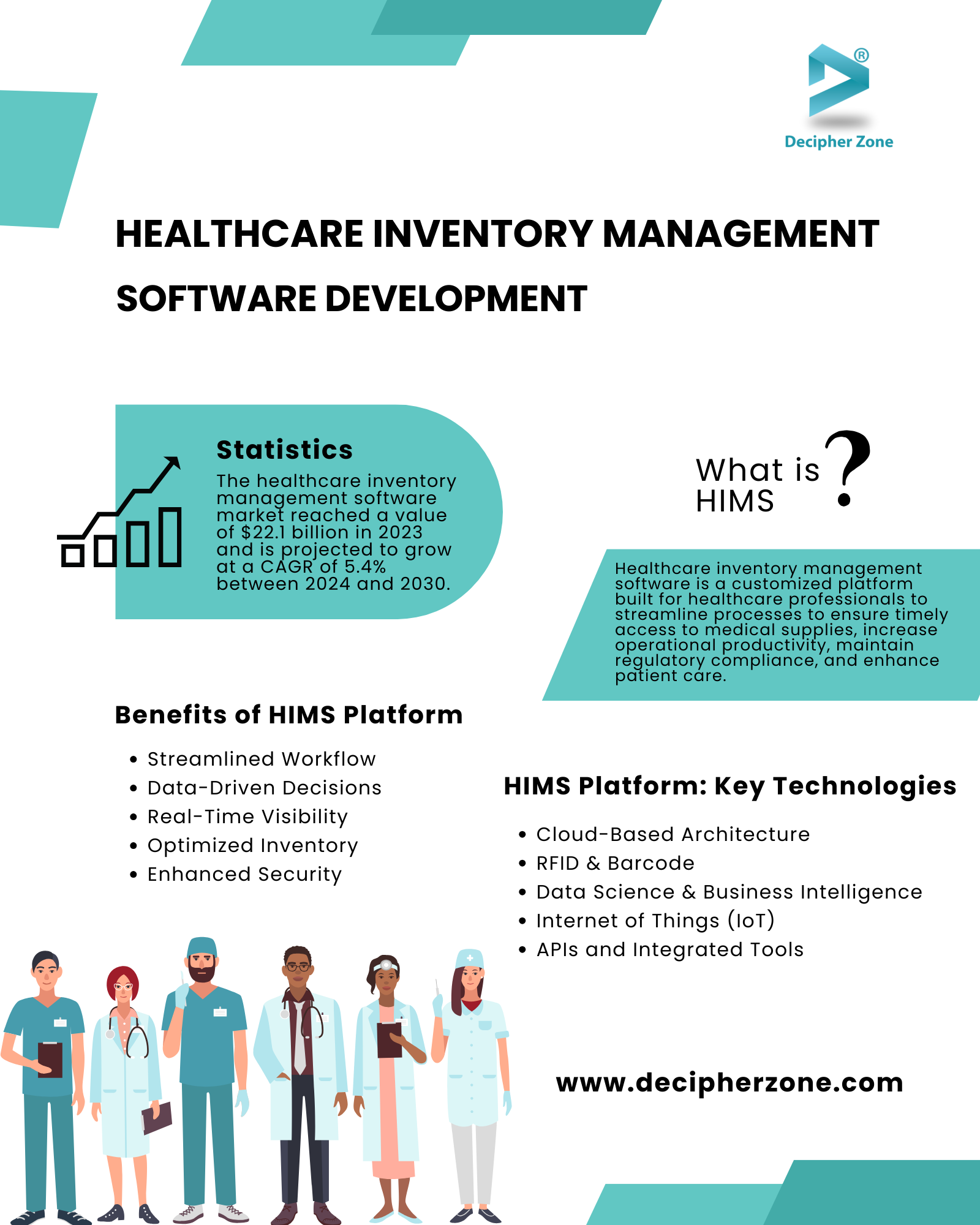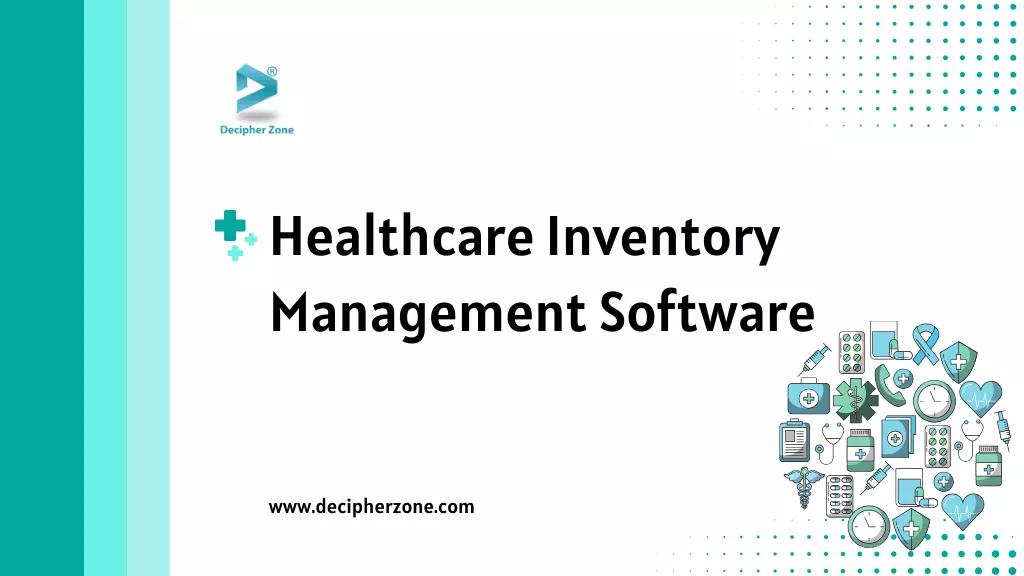Explore the challenges associated with outdated inventory management methods, the benefits of using healthcare inventory management software, the key technologies involved, and the cost considerations of implementing a healthcare inventory management system.
Healthcare inventory management software plays a crucial role in helping healthcare businesses improve their inventory tracking and handling processes.
--------------------------------------------------
In the medical field, it's essential to maintain high-quality care while effectively managing medications and medical supplies. However, the daily chaos in hospitals can make tracking medical supplies quite challenging and that’s where healthcare inventory management software comes into play.
Developing inventory management software can prove to be a prominent step in streamlining the healthcare supply chain. This software not only reduces waste in medication and tool supplies but also significantly enhances healthcare efficiency.
According to a report from Precision Business Insights, the healthcare inventory management software market reached a value of $22.1 billion in 2023 and is projected to grow at a CAGR of 5.4% between 2024 and 2030.
In this blog, we will cover every aspect of healthcare inventory management software and how it can open a pandora of opportunities for your healthcare organization.
Read: Most Popular Types of Software Development
Challenges in Healthcare Inventory Management
Healthcare inventory management defines a systematic approach to monitoring and controlling the storage, availability, and utilization of medical consumables, supplies, and equipment within a hospital facility. However, there are some major challenges that hospital staff have to deal with when it comes to traditional inventory management. These are as follows:
-
Poor Real-Time Visibility: One of the major concerns of outdated inventory management in healthcare organizations is the lack of real-time updates on stocks and supplies in the inventory. This results in unnecessary supply delays, overstock, understock, and extreme shipping costs for fast supply delivery.
-
Redundant Processes: In this digital era, manual efforts are no longer sufficient. Tracking hospital inventory using manual methods can lead to unwanted errors in supply management, slower order fulfillment, and inadequate customer experience.
-
No Insights to Oversee Demands & Volatility: Understanding the demands and changes in today’s market is essential to match the stocks. However, using traditional inventory management it is not possible to gain insights into such changes that depend on factors such as geographical location, season, and market trends.
What is Healthcare Inventory Management Software?
The healthcare inventory management software is the platform designed and developed to empower healthcare businesses to eradicate inefficient and outdated methods for inventory tracking and handling.
This software often utilizes a secure, cloud-based system to accurately track the inventory and get real-time updates on medication expiry dates, stock levels, equipment availability, and so much more.
In simple terms, healthcare inventory management software is a customized platform built for healthcare professionals to streamline processes to ensure timely access to medical supplies, increase operational productivity, maintain regulatory compliance, and enhance patient care.
Read: Top 10 Software Development Trends
Some of the features that you should consider while developing a healthcare inventory management system include medication management, medical equipment management, stock level tracking, inventory automation, medical supply management, interactive dashboard, expiry date tracking, mobile accessibility, security and compliance monitoring, reporting, automated reordering/restocking, and notification alerts.
Benefits of Healthcare Inventory Management Software
Some of the advantages that developing a custom inventory management software for your healthcare facility brings are as follows:
Streamlined Workflow
Managing vast volumes of data using a spreadsheet is time-consuming and leads to human errors. However, integrating healthcare inventory management software can help you automate numerous tedious and repetitive tasks such as purchase orders, utilization management, medication expiries, and report generation, liberating staff to focus on patient care.
Data-Driven Decision Making
Inventory management software in the healthcare industry provides in-depth insights into medical supplies and resources through comprehensive analytics and reports, enabling better decision-making and resource allocation. With the help of the detailed reports, you can also identify improvement opportunities and optimize the inventory management strategy.
Real-Time Data Access
This software empowers healthcare providers by offering real-time visibility into inventory usage patterns, stock levels, and other activities. This valuable insight allows for efficient resource reallocation, issue and trend identification, and timely supply adjustments.
Optimized Inventory
The inventory software carefully analyzes historical data and patterns to provide advanced demand forecasting and predictive analytics. This empowers healthcare organizations to efficiently meet consumer demand without overstocking or risking stockouts.
Enhanced Security
The healthcare inventory management platform is equipped with robust stock control systems that prioritize the highest standards of data security. These systems are designed to ensure compliance with relevant healthcare regulations such as HIPAA, GDPR, and other applicable standards.
Read: Sales Management Software Development
Key Technologies in Healthcare Inventory Management Software
Now the question is what makes inventory management software so reliable, robust, and secure? The answer lies in the technologies that are used while developing one, which are as follows:
-
Cloud-Based Architecture
-
RFID & Barcode
-
Data Science & Business Intelligence
-
Internet of Things (IoT)
-
APIs and Integrated Tools

Cloud-Based Architecture
Leveraging cloud-based architecture within the inventory system offers numerous advantages for healthcare providers. It enhances flexibility by allowing for easy adjustments and updates, improves accessibility by enabling authorized personnel to securely access inventory data from any location, and enhances scalability by accommodating the growing needs of the healthcare facility.
This technology ensures that inventory data is stored securely and can be retrieved efficiently, contributing to streamlined operations and effective inventory management within the healthcare setting.
RFID & Barcode
Radio-frequency identification and barcode recognition technology play a vital role in hospital inventory management software. It not only allows item identification and verification but also helps ensure efficient inventory management.
By providing real-time data on item location and movement, these technologies allow the staff to accurately track inventory levels, streamline supply chain operations, and prevent stockouts or overstocking.
Data Science & Business Intelligence
Integrating technologies such as data science and business intelligence tools in the software enables healthcare providers to productively analyze inventory data patterns and trends. These technologies offer valuable insights for optimizing operations and inventory levels while reducing overall costs, allowing hospitals to make more data-driven decisions.
Internet of Things (IoT)
IoT devices, like smart tags and equipment sensors, allow for automatic data gathering to monitor inventory. This makes it easier to manage stock levels and ensure timely replenishment of supplies.
Read: E-Commerce Warehouse Management System
APIs and Integrated Tools
Efficient data exchange and smooth communication between inventory management and other healthcare software, such as Electronic Health Records, can be facilitated through the use of APIs and integration tools. These technologies play a crucial role in enhancing workflow efficiency and interoperability in the healthcare industry.
Cost of Healthcare Inventory Management Software Development
Developing healthcare inventory management software can cost anywhere from $50,000 to $100,000 and above. The variation in the development cost entirely depends on its complexity, size, tech stack, developers, outsourcing region, hourly rates, developers’ expertise, features, functionality, maintenance, updates, and more.
Needless to say, the development costs mentioned above are just an estimation as they rely on different factors that can only be finalized after going through your healthcare organization’s requirements and scope.
FAQs
-
What is healthcare inventory management software?
The healthcare inventory management software is the platform designed and developed to empower healthcare businesses to eradicate inefficient and outdated methods for inventory tracking and handling.
-
What are the key technologies used in developing inventory management software for hospitals?
Cloud-based architecture, radio-frequency identification, barcode, data science, business intelligence, IoT, APIs, and other integrated tools are some of the major technologies that developers use to build hospital inventory management software.
-
What are the must-have features of healthcare inventory management software?
Features that you should consider while developing a healthcare inventory management system include medication management, medical equipment management, stock level tracking, inventory automation, medical supply management, interactive dashboard, expiry date tracking, mobile accessibility, security and compliance monitoring, reporting, automated reordering/restocking, and notification alerts.
Conclusion
So that was all about healthcare inventory management software development. We trust that our comprehensive blog on healthcare inventory management software development has equipped you with a thorough understanding of the subject.
Read: Pharmacy Management Software Development
That being said, if you are in search of seasoned developers who can grasp the intricacies of your requirements and craft software that not only meets but exceeds your expectations, we invite you to reach out to our experts and arrange a consultation today!

